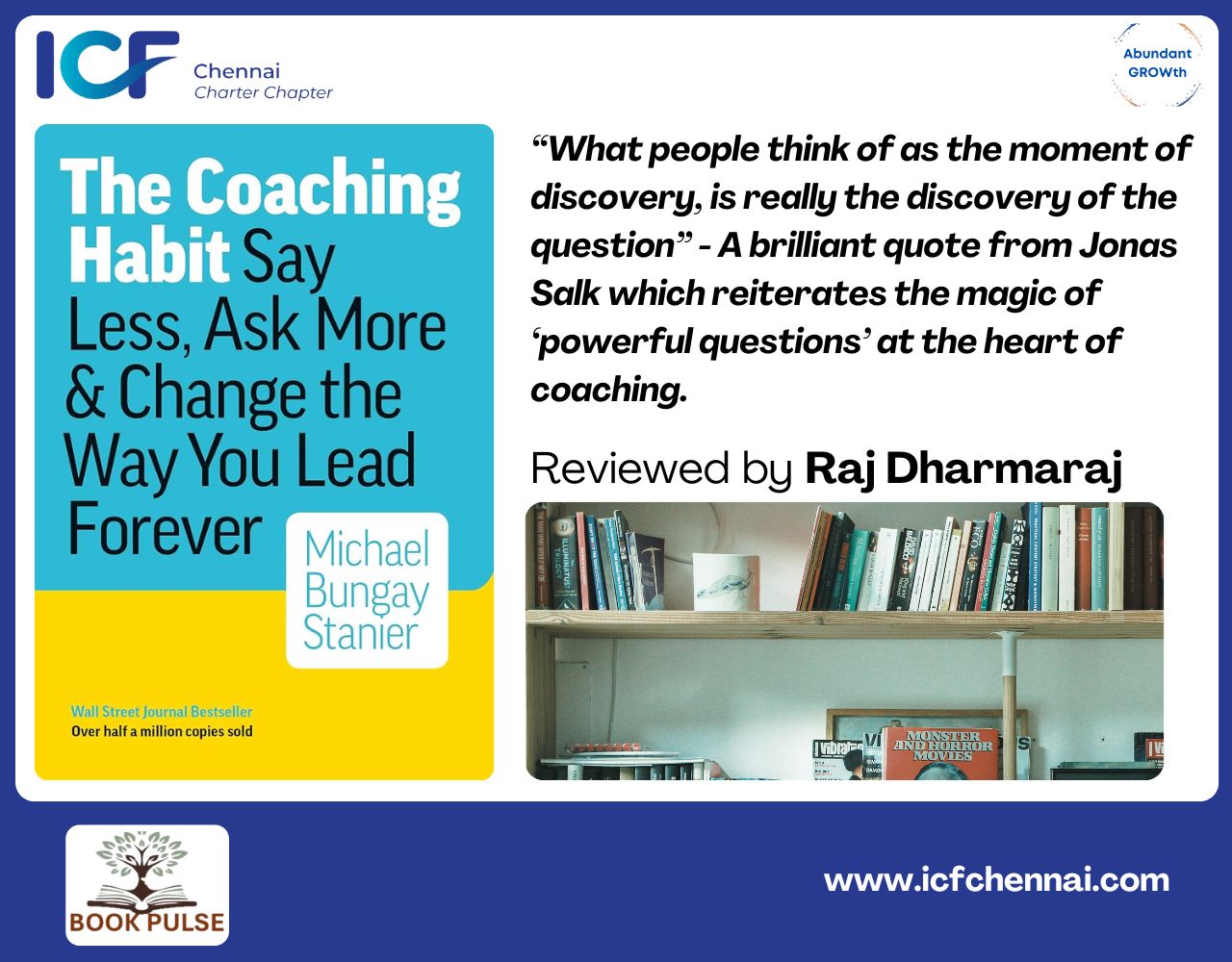The Coaching Habit – Say Less, Ask More & Change the Way You Lead Forever’ – by Michael Bungay Stanier

Reviewed by Raj Dharmaraj (PCC)
Page Two Publications (20 September 2020); Penguin Random House, 244 pages
Review:
I love airport bookstores. Occasionally a book catches your eye – you buy it on a whim because the title or cover calls to you. If you’re lucky, you dip into the first page – and the surroundings and buzz recede into the background. You barely hear the boarding announcement, or remember buckling-up, let alone who you sat next to on the flight, Before you know it, the wheels are touching down, jolting you back to the awareness that you’ve landed at your destination – yet our first reaction is ‘I haven’t finished reading yet’! Michael Bungay Stanier’s (MBS’) ‘The Coaching Habit’ is one of those serendipitous finds.
MBS – ranked among the world’s most influential coaches- brings his inimitable style to this book –written in simple yet engaging fashion and packed with powerful advice, not just for coaches, but for anyone who wants to learn to be “coach-like” – be genuinely curious, listen better without jumping to give advice, and to be able to help others realise their full potential.
The Coaching Habit is built around ‘7 Essential Coaching Questions’, that cover almost any developmental conversation. The book is ingeniously structured to introduce the Questions sequentially as individual chapters, following the arc of a typical coaching session. Together they interlink seamlessly – beginning with helping someone clearly define a challenge or opportunity, through to enabling them to create an actionable path toward a goal.
Each Question is presented as a chapter, prefaced by a ‘Coaching Masterclass’ section, that contextualizes and provides valuable tips on how one could use these in a discussion. The book is peppered with real-life anecdotes and situations, that bring the ‘7 Questions’ framework to life. True to the title, the book contains an introductory ‘Habits 101’ chapter, summarizing the latest research on habit and behaviour change, and offering helpful suggestions to enable readers to amend their ‘default-mode’ approach of being directive or advisory, to a more Socratic coaching style.
Here are some of my favourite takeaways from the book:
- The “AWE question” -the most powerful according to the author, the “Focus question” that cuts through the fog, and the “Strategic question” that clarifies priorities
- Eye-opening advice – use every interaction as an opportunity to hone and internalize one’s coaching approach – “a daily act, not just an occasional, formal, ‘Its Coaching Time!’ event”
- Three negative circles that challenge our work and personal lives today – “the Bind, the Grind and the Resigned” – and coaching’s effectiveness in dealing with these
- Innovative suggestions on how to enhance written communication – emails or messages- with coaching-style language
- A Brilliant quote from Jonas Salk which reiterates the magic of ‘powerful questions’ at the heart of coaching – “What people think of as the moment of discovery, is really the discovery of the question”
As a bonus, The Coaching Habit offers a wealth of related reference material, behavioural research and how-to tips and videos available on the author’s companion website – www.thecoachinghabit.com.
You can choose to savour this book a chapter at a time, or dive-in and finish in one sitting. Whether you’re a practicing coach, managing employees at work, or just keen to offer developmental support to someone in your life, this book provides a treasure-trove of insights and takeaways you can begin practicing immediately.
An inspirational coach I know has a favourite catchphrase about sustainable habit change – “Simple, not Easy”. While absolutely true, The Coaching Habit is a guidebook that Simplifies the coaching process, while making it Easier to adopt as a habit. A highly recommended read –for experienced coaches interested in sharpening their skills, as much as for anyone who might benefit from a taste of coaching elixir.
Raj Dharmaraj
The views and opinions expressed in guest posts featured on this blog are those of the author and do not necessarily reflect the opinions and views of the International Coach Federation (ICF). The publication of a guest post on the ICF Blog does not equate to an ICF endorsement or guarantee of the products or services provided by the author.
Additionally, for the purpose of full disclosure and as a disclaimer of liability, this content was possibly generated using the assistance of an AI program. Its contents, either in whole or in part, have been reviewed and revised by a human. Nevertheless, the reader/user is responsible for verifying the information presented and should not rely upon this article or post as providing any specific professional advice or counsel. Its contents are provided “as is,” and ICF makes no representations or warranties as to its accuracy or completeness and to the fullest extent permitted by applicable law specifically disclaims any and all liability for any damages or injuries resulting from use of or reliance thereupon.

